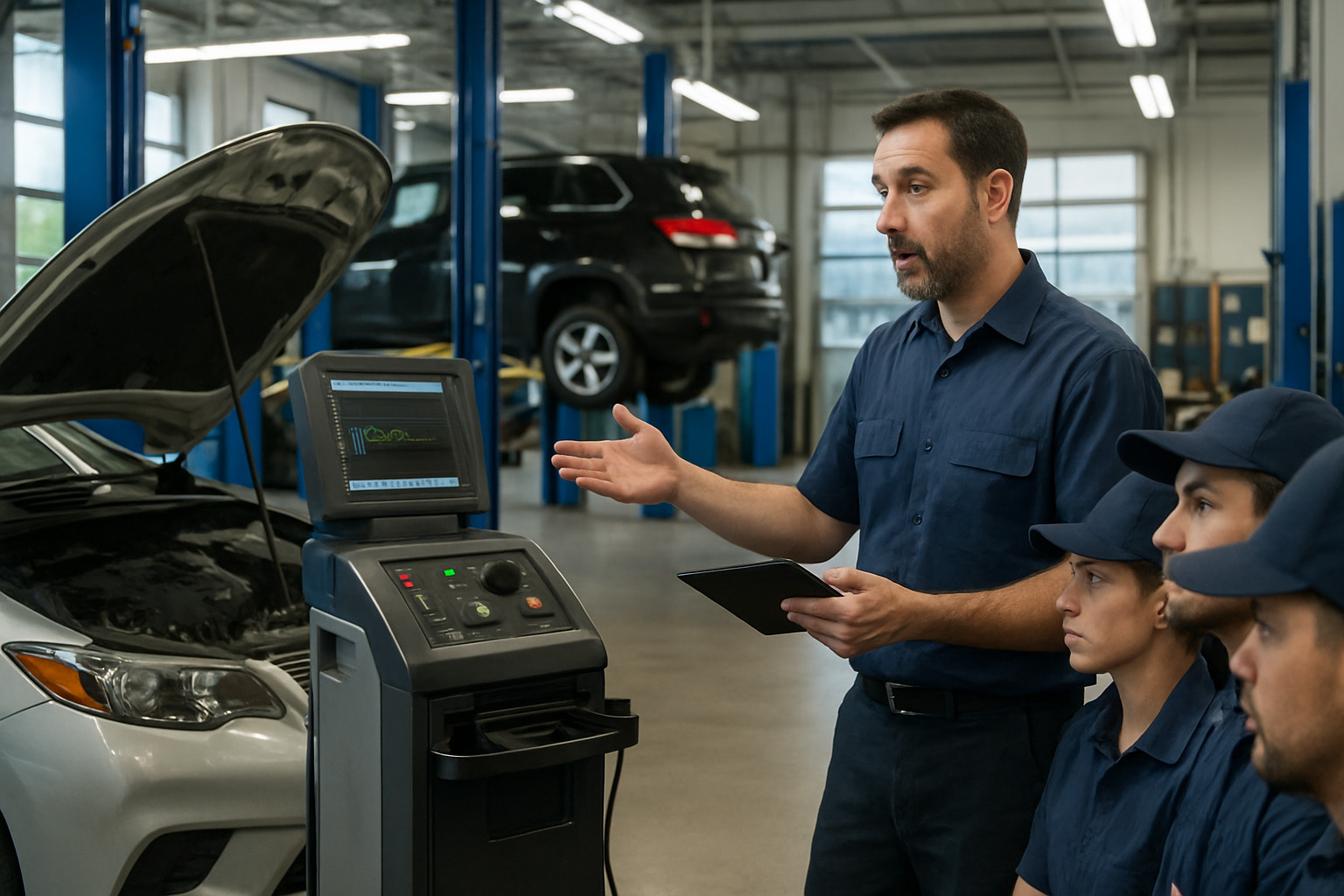Auto Tech Seminars: 7 Powerful Ways to Find the Best 2025
Why Auto Tech Seminars Are Essential for Today’s Automotive Professionals
Auto tech seminars provide hands-on training for automotive technicians to master rapidly evolving vehicle technologies like electric vehicles, advanced driver assistance systems, and complex diagnostic tools.
Quick Answer – Where to Find Auto Tech Seminars:
• Community colleges – ASE-accredited programs with certificate and degree tracks
• Training companies – AVI, UTI, Automotive Seminars Inc. offer specialized workshops
• Industry associations – TST, ATRA provide expert-led technical sessions
• Online platforms – Live webinars and on-demand video courses
• Manufacturer programs – Ford ACE, Toyota, GM certification tracks
• Trade shows – AutoTech 2025 and regional automotive events
The automotive industry is changing faster than ever. As Henry Ford once said, “The only real mistake is the one from which we learn nothing.” Today’s technicians face a skills gap that’s widening with each new model year.
The numbers tell the story: Nearly 70% of AutoTech attendees say they go to seminars to keep up with new trends and innovations. With over 105 million vehicles on the road and approximately 67,800 annual job openings for automotive technicians, the demand for skilled professionals has never been higher.
Whether you’re a working technician looking to master EV diagnostics, a shop owner wanting to train your team, or someone considering a career change into automotive, auto tech seminars offer the fastest path to stay current with industry demands.
The median salary for automotive technicians reached $47,770 in 2023, but specialists with advanced training in areas like hybrid systems and ADAS calibration command significantly higher wages.

Understanding Auto Tech Seminars
Think of auto tech seminars as your fast-track ticket to staying relevant in an industry that’s changing at breakneck speed. These aren’t your typical classroom lectures – they’re intensive, hands-on workshops where you’ll get your hands dirty with the latest automotive technologies.
The reality is simple: today’s vehicles are rolling computers packed with more processing power than the first space shuttles. That means the diagnostic skills that worked perfectly fine on a 2015 model might leave you scratching your head when a 2024 EV rolls into your bay.
These seminars bridge that gap beautifully. Whether you’re wrestling with electric vehicle diagnostics, trying to understand ADAS calibration, or just need to brush up on modern electrical systems, there’s a program designed to get you up to speed quickly.
The beauty of auto tech seminars lies in their flexibility. Entry-level technicians can build solid foundations in automotive fundamentals, while master techs can dive deep into cutting-edge technologies. It’s continuing education that actually makes sense for your career.
What Exactly Happens at an Auto Tech Seminar?
Picture this: you walk into a training bay filled with the latest diagnostic equipment, real vehicles, and instructors who’ve been in the trenches. That’s what awaits you at a quality auto tech seminar.
The curriculum typically blends theory with real-world application in ways that stick. You might start the morning learning about high-voltage safety protocols, then spend the afternoon actually working on a hybrid drivetrain. No boring PowerPoint marathons here – it’s all about getting your hands on the actual tools and systems you’ll encounter back in your shop.
Live demonstrations are where the magic happens. Instructors walk you through complex procedures step-by-step, sharing those “here’s what the manual doesn’t tell you” moments that can save you hours of frustration later. Watching an expert diagnose an intermittent electrical fault using an oscilloscope is worth its weight in gold.
The Q&A sessions often become the most valuable part of the day. These experienced instructors have seen it all, and they’re not shy about sharing war stories and troubleshooting tricks that you won’t find in any service manual.
Case studies round out the experience, giving you a chance to work through real diagnostic scenarios. You might tackle a complex network communication issue or figure out why an ADAS system keeps throwing random codes. It’s problem-solving practice that translates directly to billable hours back home.
Who Should Attend Auto Tech Seminars
The short answer? Pretty much anyone who works with cars or wants to. Auto tech seminars cast a surprisingly wide net when it comes to their audience.
Students in automotive programs love these seminars because they get exposure to technologies their schools might not have in their labs yet. There’s nothing quite like working with brand-new diagnostic equipment to spark your enthusiasm for the field.
Working technicians make up the bulk of attendees, and for good reason. Staying current isn’t optional anymore – it’s survival. Whether you’re trying to master EV service procedures or figure out the latest manufacturer updates, these seminars keep you competitive.
Shop owners and service managers find tremendous value in these programs, both for their own knowledge and for training their teams efficiently. It’s often more cost-effective to send your whole team to a seminar than to fumble through learning new technologies on customer vehicles.
Fleet managers responsible for maintaining dozens or hundreds of vehicles use seminars to ensure their staff can handle whatever rolls through the door. When downtime costs money, having properly trained technicians isn’t a luxury – it’s a necessity.
Even career changers looking to enter the automotive field often start with introductory seminars to test the waters. And yes, serious DIY enthusiasts show up too, wanting to better understand their own vehicles and tackle more sophisticated repairs safely.
The beauty of auto tech seminars is that they meet you where you are. Whether you’re installing your first scan tool or calibrating advanced driver assistance systems, there’s a program that fits your skill level perfectly.
Top Providers & Program Types
Finding the right auto tech seminars means understanding the different types of providers and how they deliver training. The automotive education landscape has transformed dramatically, offering everything from traditional classroom instruction to cutting-edge virtual reality training sessions.
Instructor-led training centers remain the gold standard for hands-on learning. These facilities invest heavily in the latest diagnostic equipment and vehicle platforms, giving you access to tools that might cost thousands of dollars individually. You’ll work alongside experienced technicians who’ve seen it all and can share real-world insights that textbooks simply can’t provide.
Community colleges have emerged as powerhouse providers, offering structured programs that blend academic rigor with practical application. Their campus labs often rival professional shop environments, complete with alignment racks, emissions analyzers, and hybrid vehicle training platforms.
Nonprofit associations bring a unique perspective to automotive training. These organizations focus purely on education without the pressure of profit margins, often resulting in incredibly detailed and thorough programs. Their instructors are typically master technicians who genuinely love teaching.
OEM partnerships create specialized training opportunities that you won’t find anywhere else. When Ford or Toyota develops new technology, they need technicians who understand it inside and out. These manufacturer-sponsored programs give you direct access to engineering knowledge and proprietary diagnostic procedures.
Online academies have revolutionized accessibility in automotive training. No longer do you need to travel hundreds of miles or take time off work to attend a quality seminar. Live webinars allow real-time interaction with instructors, while on-demand video courses let you learn at your own pace.
Hybrid models represent the future of automotive education. These programs combine the convenience of online theory with essential hands-on laboratory sessions. You might complete electrical fundamentals online, then attend a weekend workshop to practice with actual diagnostic equipment.
Major industry events like the Automotive Technology Expo showcase the latest training technologies and connect you with leading providers. These gatherings offer mini-seminars and live demonstrations that help you evaluate different training approaches before committing to a full program.

National & Regional Training Networks
Think of national training networks as the backbone of automotive education. These industry alliances work behind the scenes to ensure that auto tech seminars maintain consistent quality standards across the country. When you attend a certified program in California or Maine, you’re getting training that meets the same rigorous requirements.
Manufacturer sponsorships make these networks particularly valuable. Instead of learning generic diagnostic procedures, you’ll master the exact methods that vehicle engineers intended. These partnerships often include access to technical service bulletins, special tools, and software updates that independent shops struggle to obtain.
The beauty of these networks lies in their job placement support. Many maintain relationships with hundreds of dealerships and independent shops nationwide. Complete their training, and you’ll often find yourself connected directly with employers who specifically seek technicians with your newly acquired skills.
Regional networks understand that automotive needs vary by location. Areas with harsh winters emphasize battery diagnostics and cold-weather starting systems. Regions with heavy truck traffic focus on diesel engines and commercial vehicle electronics. This localized approach ensures your training matches real-world demand in your area.
Skill standards across these networks help employers quickly evaluate your qualifications. A Level 2 electrical certification means the same thing whether you earned it in Texas or Vermont, simplifying the hiring process and increasing your mobility within the industry.
Community College Fast-Track Programs
Community colleges have quietly become some of the best places to find quality auto tech seminars. These institutions offer incredible value, combining affordability with access to professional-grade equipment and experienced instructors.
Certificate tracks provide the fastest path to employment, typically requiring just 35-36 credits that you can complete in less than a year. These focused programs concentrate on immediately marketable skills like engine performance diagnostics and electrical troubleshooting.
Degree paths offer more comprehensive training for those planning long-term careers in automotive service. Associate degree programs require around 60 credits but provide broader knowledge that prepares you for supervisory roles and specialized positions.
Cooperative education components bridge the crucial gap between classroom theory and shop reality. Students gain 60+ hours of supervised work experience at local automotive businesses, often leading directly to job offers upon graduation.
Campus labs at quality programs mirror real automotive service environments. You’ll work with the same scan tools, oscilloscopes, and diagnostic software that professional technicians use daily. This familiarity eliminates the learning curve when you start your first job.
The ASE Education Foundation certifies many community college programs, ensuring they meet National Institute for Automotive Service Excellence standards. Graduates of these accredited programs can substitute their formal training for one year of the two years of work experience typically required for ASE certification.
Success stories from these programs speak volumes about their effectiveness. Hudson Valley Community College reports that about nine out of ten students in their Automotive Technical Services program secure employment before graduation. This track record reflects both the quality of training and strong industry relationships that community colleges maintain.
Curriculum & Certification Pathways
The world of automotive technology moves fast, and auto tech seminars are designed to keep pace. Think of these programs as your roadmap through the maze of modern vehicle systems – from the electrical fundamentals that power everything to the sophisticated sensors that help cars avoid accidents.
Most seminars start with electrical fundamentals because everything else builds on this foundation. You’ll learn to read circuits like a detective follows clues, using multimeters and oscilloscopes to track down problems that would stump technicians just a decade ago. These skills become absolutely essential when you’re working on electric vehicles or troubleshooting the dozens of computers in today’s cars.
Engine performance training has evolved far beyond basic tune-ups. Modern seminars teach you to interpret data streams from multiple sensors simultaneously, understanding how hybrid powertrains work and why emission control systems behave the way they do. It’s like learning to conduct an orchestra where every instrument is a sensor feeding information to the engine’s brain.
EV drivetrains represent the future that’s already here. These specialized sessions cover high-voltage safety procedures that could literally save your life, battery diagnostics that require completely different thinking, and charging systems that are becoming as common as gas pumps. As Automotive Tech Innovations continue reshaping the industry, EV knowledge isn’t just helpful – it’s becoming essential for career survival.
ADAS calibration might sound intimidating, but these systems are everywhere now. Seminars teach you how to properly align cameras and radar sensors so that automatic emergency braking and lane-keeping systems work correctly. One small mistake here could put someone’s safety at risk, so the training is thorough and precise.
Safety protocols weave through every aspect of modern automotive training. Whether you’re working with diesel exhaust fluid systems or 400-volt battery packs, knowing the proper procedures protects both you and your customers. The best seminars make safety second nature, not an afterthought.
How Auto Tech Seminars Support ASE Certification
Auto tech seminars and ASE certification work together like a well-tuned engine. The seminars provide the knowledge and hands-on experience, while ASE certifications give you the credentials that employers recognize and customers trust.
Many seminars offer targeted exam preparation that goes beyond just studying for tests. You’ll work through practice scenarios that mirror real ASE exam questions, but more importantly, you’ll understand the reasoning behind the correct answers. It’s the difference between memorizing facts and truly understanding how systems work.
Here’s something that surprises many people: graduates of ASE-accredited training programs can substitute their education for one year of the typical two-year work experience requirement. That means you can get certified faster and start earning higher wages sooner.
The continuing education aspect is equally valuable. ASE requires certified technicians to keep learning, and quality seminars provide the continuing education units you need for credential renewal. This creates a natural cycle of lifelong learning that keeps your skills sharp and your certifications current.
Skills You’ll Master Inside Auto Tech Seminars
Walk into any modern auto tech seminar, and you’ll quickly find that today’s automotive repair looks nothing like your grandfather’s garage. Scope reading has become as fundamental as knowing how to use a wrench. You’ll learn to interpret waveforms that reveal what’s happening inside components in real-time.
Network diagnostics skills separate good technicians from great ones. Modern vehicles contain dozens of computers that talk to each other constantly. When that communication breaks down, you need to know how to listen in on the conversation and figure out who stopped talking.

Software updates and module programming have become routine maintenance tasks. Seminars teach you the proper procedures for reflashing control modules and the safety precautions necessary when you’re essentially performing surgery on a vehicle’s brain.
Battery service now spans everything from traditional 12-volt systems to massive EV battery packs and the 48-volt systems in mild hybrids. Each type requires different safety procedures, diagnostic approaches, and service techniques. The high-voltage training alone could open doors to specialized, high-paying positions.
Many comprehensive programs also include shop management fundamentals. Understanding workflow, customer communication, and basic business principles helps you advance beyond the technician level. Whether you want to become a service advisor, shop foreman, or start your own business, these skills prove invaluable.
The career ladder in automotive technology has never offered more opportunities, but climbing it requires continuous learning. Auto tech seminars provide the rungs that help you reach the next level.
Choosing the Right Format, Schedule & Budget
Picking the perfect auto tech seminar format can make or break your learning experience. Think of it like choosing the right tool for a job – each approach has its sweet spot.
In-person bootcamps feel like automotive boot camp (in the best way possible). You’re surrounded by real diagnostic equipment, breathing shop air, and getting your hands dirty with actual vehicle problems. These intensive programs pack weeks of learning into concentrated sessions, perfect if you can block out time for focused training.
Live online seminars have become surprisingly effective. You miss the shop smell, but you gain something valuable – convenience. No travel costs, no hotel bills, and you can attend that evening EV diagnostics session without burning vacation days. Many instructors say their virtual classes feel almost identical to in-person experiences.
On-demand video courses work like having a master technician available 24/7. Struggling with CAN bus diagnostics at 2 AM? Fire up that module again. These courses shine for self-motivated learners who need ultimate flexibility.
Blended learning combines the best of all worlds. You might watch theory videos at home, then show up for hands-on lab sessions where you actually calibrate ADAS systems and test high-voltage circuits. It’s efficient and thorough.
Tuition varies wildly depending on what you choose. A single webinar might cost $55-95, while comprehensive certification programs can reach several thousand dollars. Many programs sweeten the deal with tool credits worth $1,700 or more – essentially giving you professional diagnostic equipment as part of your training.
| Format | Cost Range | Best For | Time Commitment |
|---|---|---|---|
| In-person bootcamp | $500-$3,000+ | Hands-on learners, networking | 3-14 days intensive |
| Live online | $55-$800 | Working techs, budget-conscious | Evenings/weekends |
| On-demand video | $29-$500 | Self-paced learners | Flexible |
| Blended learning | $300-$2,000 | Best of both worlds | Mixed schedule |
Cost Breakdown & Financial Aid Options
Let’s talk real numbers. Auto tech seminars cost more than just tuition when you factor in travel, hotels, lost wages, and equipment. A $1,200 seminar might actually cost $2,500 when you add everything up.
But here’s the good news – funding options abound if you know where to look.
Subscription models work like Netflix for automotive training. Pay a monthly or annual fee and access unlimited courses. This approach makes sense if you’re hungry for knowledge or need to stay current across multiple specialties.
Pay-per-class options suit targeted learning perfectly. Need to master Tesla diagnostics or understand Ford’s latest ADAS calibration procedures? Buy just what you need instead of a full program.
Workforce development funding through state and local agencies can slash your costs dramatically. Many regions desperately need skilled automotive technicians and will subsidize your training to address local shortages.
Employer reimbursement programs recognize that trained technicians generate more revenue. Smart shops and dealerships invest in their people, especially for high-profit specialties like Automotive Connectivity Solutions.
Scholarship opportunities exist through industry associations, manufacturers, and educational foundations. Veterans can often use GI Bill benefits for automotive training programs, making career transitions more affordable.
The key is asking about funding before you enroll. Many providers maintain lists of available assistance programs and can guide you through the application process.
Benefits of Each Delivery Format
Networking opportunities make in-person seminars shine. You’ll meet technicians from other shops, share war stories, and build professional relationships that last for years. Plus, working with expensive diagnostic equipment gives you confidence you can’t get from videos alone.
Travel savings make online formats attractive for budget-conscious learners. Skip the hotel bills and gas money while attending sessions from your own garage or break room. The ability to record sessions means you can review complex procedures until they stick.
Flexible pacing suits different learning styles perfectly. Some technicians absorb electrical theory quickly but need extra time with oscilloscope operation. Self-paced courses accommodate these differences without holding anyone back.
Immersive lab experiences provide safe environments for practicing dangerous procedures. Learning high-voltage safety protocols on a live EV battery pack isn’t recommended, but simulator training prepares you for real-world situations.
One important note: certification hours from different formats may not be treated equally by certifying bodies. Always verify that your chosen format meets your specific credential requirements before enrolling.
Upcoming Auto Tech Seminars & How to Enroll
The world of auto tech seminars never sleeps, and that’s great news for technicians looking to stay ahead of the curve. Right now, some of the most exciting training opportunities are taking shape across the country.
Summer EV intensives have become the hottest ticket in automotive training. As more electric vehicles hit the road, shops are scrambling to prepare their teams for the service demands ahead. These comprehensive programs dive deep into high-voltage safety protocols, battery diagnostic procedures, and the ins and outs of charging system troubleshooting. Think of them as your crash course in the future of automotive service.
ADAS roadshows are bringing sophisticated calibration training directly to your backyard. Instead of traveling hundreds of miles to a training center, these mobile programs set up shop in regional locations with all the latest calibration equipment. You’ll get hands-on experience with multiple vehicle platforms and learn to use the same tools you’ll need in your shop.
For those working with commercial vehicles, diesel diagnostics weeks offer intensive training on the complex emission control systems that can make or break a fleet operation. Modern SCR, DPF, and EGR systems require specialized knowledge that these focused programs deliver in concentrated doses.
The big kahuna of automotive training events, AutoTech 2025, is celebrating its 25th anniversary with promises of groundbreaking content. This year’s show will spotlight software-defined vehicles, autonomous driving developments, and how artificial intelligence is reshaping automotive service. It’s part seminar, part trade show, and all opportunity.
Don’t overlook the live webinars that pop up throughout the year. These typically run 1-2 hours and focus on timely topics like new model introductions or updated diagnostic procedures. They’re perfect for staying current without major time commitments.
Finding Auto Tech Seminars Near You
The best auto tech seminars might be closer than you think. Local chapters of national organizations often host regional training that’s custom to your area’s specific needs. The Technicians Service Training (TST) organization runs active chapters throughout New York, Massachusetts, Connecticut, and New Jersey, bringing quality education right to Northeast technicians.
Event portals and training company websites are your best friends for staying informed about upcoming opportunities. Most providers maintain current listings and offer email newsletters that give you the inside scoop on new programs and early-bird pricing deals.
Here’s a tip many technicians miss: dealership bulletins sometimes announce manufacturer-sponsored training events. These programs focus on specific vehicle lines or newly introduced technologies, and they’re often open to independent shop technicians, not just dealership staff.
The automotive community loves to share knowledge, and tech forums are goldmines for training recommendations. Experienced technicians regularly share reviews and suggestions about programs they’ve attended. It’s like having a network of mentors pointing you toward the best opportunities.
Keep an eye on our Car Tech Updates section too. We regularly feature information about upcoming training opportunities and industry developments that impact what technicians need to know.
Enrolling in Auto Tech Seminars Safely & Quickly
Before you hit that “register” button for auto tech seminars, take a moment to check the prerequisites. Some advanced programs have specific requirements – like prior ASE certifications or documented work experience. L3 hybrid certification prep, for instance, requires you to already hold A6 and A8 certifications.
PPE requirements vary depending on what you’re learning. High-voltage training demands Class 0 insulating gloves and other specialized safety equipment. Some providers supply everything you need, while others expect you to bring your own gear. Check before you go – nobody wants surprises when it comes to safety equipment.
Smart technicians hunt for early-bird discounts, which can slash 20% or more off regular pricing. Just read the fine print on cancellation policies. Some discounted registrations come with stricter refund rules.
The confirmation process typically involves payment processing, prerequisite verification, and receiving your course materials. Many programs now provide digital manuals and access codes ahead of time, so you can hit the ground running when training starts.
Here’s something that should motivate you: the Bureau of Labor Statistics salary outlook shows continued growth in automotive technician employment. Investing in ongoing education through seminars isn’t just smart – it’s essential for staying competitive in this evolving field.

Frequently Asked Questions about Auto Tech Seminars
When you’re considering auto tech seminars, it’s natural to have questions about what to expect. Let’s tackle the most common concerns that technicians and shop owners have when they’re ready to invest in their education.
What is the typical duration of a seminar?
The beauty of auto tech seminars is that they come in all shapes and sizes to fit your schedule and learning goals. If you’re looking for a quick update on a specific topic, single-session webinars are perfect – they typically run 1-2 hours and dive deep into things like new diagnostic procedures or the latest manufacturer updates.
Need something more comprehensive? Day-long workshops are incredibly popular, running about 8-10 hours and covering broader topics like electrical diagnostics or hybrid system service. These give you enough time to really dig into the material without overwhelming your schedule.
For complex systems that require serious hands-on practice, multi-day intensives are where the magic happens. Hybrid and EV workshops often span 2-5 days because there’s simply no rushing through 30+ hours of safety procedures, diagnostic techniques, and practical application. You can’t learn high-voltage safety in an afternoon!
If you’re looking at comprehensive certification programs, think bigger. UTI’s automotive program takes 51 weeks to complete, while community college certificate programs typically require 35-36 credit hours. These aren’t quick fixes – they’re career investments.
Do online auto tech seminars count toward ASE renewal?
This is probably the question we hear most often, and the answer is a resounding yes – with some important details. Many online auto tech seminars absolutely provide continuing education units (CEUs) that count toward your ASE certification renewal requirements.
Here’s what you need to know: ASE requires certified technicians to complete continuing education every five years to keep their credentials current. The catch is that the education must be relevant to your specific certification areas and come from approved sources.
Before you sign up for that online seminar, do yourself a favor and verify two things. First, make sure the provider is ASE-approved. Second, check that the course content actually aligns with your certification needs. There’s nothing worse than spending time and money on a great seminar only to find out it doesn’t count toward your renewal.
Keep detailed records of everything – certificates of completion, course descriptions, the whole nine yards. Your future self will thank you when renewal time comes around.
How much hands-on time can I expect?
This question gets to the heart of what makes a good auto tech seminar – practical experience you can actually use. The hands-on component varies dramatically depending on the format you choose, so let’s break it down.
In-person workshops are the gold standard for hands-on learning. Quality programs typically dedicate 50-70% of their time to practical exercises where you’re actually working with diagnostic equipment and real vehicle systems. You’re not just watching someone else do it – you’re getting your hands dirty.
Online seminars face obvious limitations when it comes to hands-on experience. However, innovative providers are getting creative with virtual simulations and assignments that have you practice on your own vehicles or equipment. It’s not the same as being in a lab, but it’s better than pure theory.
Hybrid programs offer an interesting middle ground. You might complete theoretical modules online, then attend separate hands-on lab sessions. This approach maximizes your learning efficiency while ensuring you get that crucial practical experience.
When you’re evaluating seminars, don’t be shy about asking specific questions about the hands-on component. You want programs that use current diagnostic tools and work with late-model vehicles that actually represent what you’ll see in your bay every day. After all, there’s a big difference between understanding a concept and being confident enough to apply it when a customer’s car is on your lift.
Conclusion
The world of automotive technology never slows down, and neither should your learning journey. Auto tech seminars have become the lifeline for professionals who want to stay relevant in an industry where yesterday’s cutting-edge becomes today’s basic requirement.
Think about it – five years ago, most technicians rarely encountered electric vehicles. Today, EV knowledge isn’t just helpful; it’s essential for career survival. The same pattern repeats with ADAS systems, advanced diagnostics, and software-defined vehicles. What seems specialized today becomes mainstream tomorrow.
The beauty of auto tech seminars lies in their variety and accessibility. Whether you’re a weekend warrior wanting to understand your own car better, or a shop owner looking to future-proof your business, there’s a training path designed for you. The investment might seem significant upfront, but consider this: specialized technicians consistently earn more than their generalist counterparts, often $10,000-15,000 above the median salary.
We’ve seen how community colleges offer affordable, comprehensive programs while online platforms provide flexibility for busy professionals. Manufacturer-sponsored training opens doors to dealership opportunities, and hands-on workshops build the confidence that only comes from real practice with actual diagnostic equipment.
The numbers don’t lie – auto tech seminars work. Graduates consistently report better job prospects, higher wages, and increased confidence in tackling complex repairs. More importantly, they feel prepared for whatever technological curveball the industry throws next.
At Car News 4 You, we live at the intersection of automotive innovation and car culture. We see how technology transforms not just vehicles, but the entire ecosystem of people who service, modify, and enjoy them. The technicians who thrive are those who accept continuous learning and view each new challenge as an opportunity to grow.
Your career deserves the same attention you give to diagnosing a complex electrical fault – methodical, thorough, and focused on finding the right solution. Auto tech seminars provide that solution, offering a clear pathway from where you are today to where the industry is heading tomorrow.
The future of automotive service belongs to those who prepare for it. Every seminar you attend, every new skill you master, and every certification you earn builds toward a more secure and rewarding career.
Ready to accelerate your automotive career? Check out more local car events and training opportunities to find the perfect learning experience for your next professional milestone.








